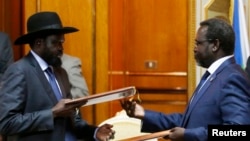Monday marked the one-year anniversary of the start of the conflict in South Sudan.
The conflict erupted December 15, 2013. President Salva Kiir accused his former Vice President Riek Machar and others of plotting to overthrow the government.
It is estimated that 1.8 million South Sudanese have been driven from their homes, and both sides have accused each other of committing atrocities.
Akshaya Kumar, policy analyst on Sudan and South Sudan for the Enough Project, an organization that aims to end genocide and crimes against humanity, said her organization believes the violence will only stop if there are severe consequences for those who undermine the peace process and orchestrate human rights abuses.
“The one-year anniversary of the fighting in South Sudan is a true tragedy both for the people of South Sudan and for the hope which South Sudan represented for the continent. And, our message for the people of South Sudan is we, as advocates in the United States of America, [stand with you, and] we hope the US government will stand with you as well,” she said.
Kumar said the Enough Project agrees with leaders of the Intergovernmental Authority on Development (IGAD) in calling for targeted sanctions for those obstructing peace and responsible for grave human rights abuses.
IGAD has been mediating talks between the parties in Ethiopia’s capital, Addis Ababa.
“The IGAD mediators have already said on a number occasions that those who deviate from the cessation of hostilities agreement or obstruct further peace should face targeted sanctions, specifically asset freezes and travel bans to make those leaders, who perhaps have families outside of the country and have their wealth stored elsewhere, feel some of the pain which they are putting their own people through,” Kumar said.
She also said the anniversary presents an opportunity for consumers in India and China to consider their stake in the South Sudan war.
“From our perspective, the entire world is in a way connected to this conflict in South Sudan because of the oil exports that continue to flow through pipelines from South Sudan through Sudan. And primarily, that oil is bought by the national oil company of India and Petro China. Therefore, consumers in both countries are in some way connected to the conflict,” she said.
Kumar said her organization has called on both sides in the conflict to commit to respecting the cessation of hostilities agreement they have signed.
“It is our position that, even as those [IGAG-mediated] discussions continue, both sides should adhere to and affirm the existing commitment to putting down their guns and stepping away from the front lines, instead of doing what they are doing, which is resupplying, preparing for war and advancing the battle,” she said.





